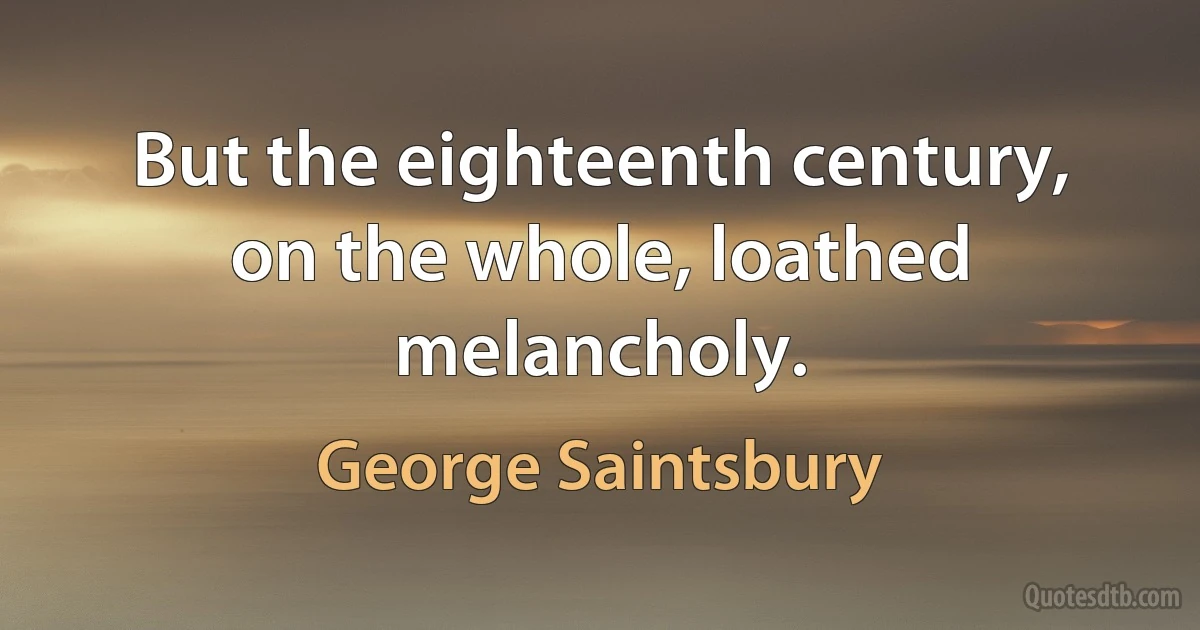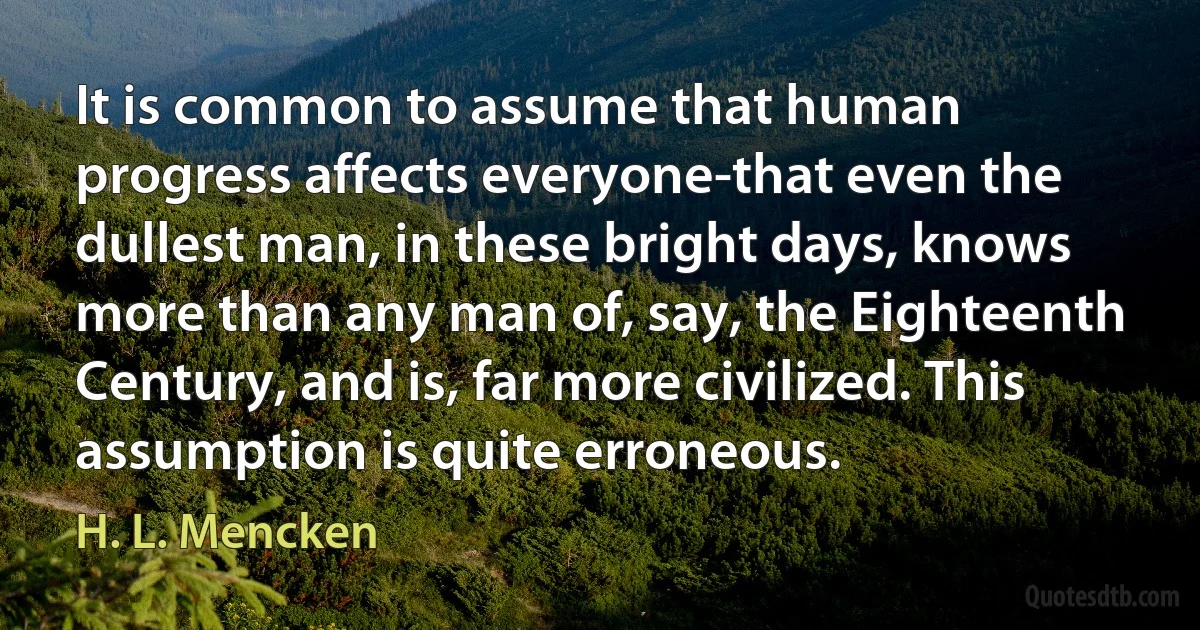Eighteenth Quotes - page 4
Take an eighteenth century English whig. Let him be a mystic. Endow him with the logical subtlety of the great schoolmen and their belief in the powers of human reason, with the business capacity of a successful lawyer, and with the lucidity of the best type of French mathematician. Inspire him (Heaven knows how) in his early youth with a passion for Hegel. Then subject him to the teaching of Sidgwick and the continual influence of Moore and Russell. Set him to expound Hegel. What will be the result? Hegel himself could not have answered this question a priori, but the course of world history has solved it ambulando by producing McTaggart.

C. D. Broad
The relation of tonic to dominant is the foundation of Western triadic tonality. The attempt of the early nineteenth century to substitute third or mediant relationships for the classical dominant amounted to a frontal attack on the principles of tonality, and it eventually contributed to the ruin of triadic tonality. This ruin was accomplished from within the system, however, as mediant relationships were essential to tonality as conceived in the eighteenth century.

Charles Rosen
By the late eighteenth century, there is a sad and permanent decline in the quality of music written for young performers or beginners: one has only to compare Bach's Album for Anna Magdalena Bach and the Two-Part Inventions with anything that came later. No composer of importance between Bach and Schumann turned his hand to writing for children, and Schumann's essays came after his years of greatest inspiration for piano writing had gone. (Mozart is the odd exception, but then he was, in fact, almost incapable of writing really easy pieces: he no doubt believed that his Sonata in D Major, K.576, was easy, perhaps because all the hard passages in the first movement were in simple two-part counterpoint, one voice in each hand, but he was wrong.)

Charles Rosen
Life of Paul of the Cross, founder of the Passionists. Astonishing really that he should be so little known, should have left so little impression..Strangely thrilling that St Paul - end of the eighteenth century! - should have prayed all his life for the conversion of England, pledging his sons to do likewise. Once, during Mass, he had a vision of my sons in England. But only in 1841, almost seventy years after his death, did they actually set foot on English soil - through Fr Dominic Barberi. It was he who received Newman into the Church..

Ida Friederike Görres
In the writings of such "pagan" philosophers as Plutarch and Porphyry we find a humanitarian ethic of the most exalted kind, which, after undergoing a long repression during medieval churchdom, reappeared, albeit but weakly and fitfully at first, in the literature of the Renaissance, to be traced more definitely in the eighteenth century school of "sensibility." But it was not until after the age of Rousseau, from which must be dated the great humanitarian movement of the past century, that Vegetarianism began to assert itself as a system, a reasoned plea for the disuse of flesh-food.

Henry Stephens Salt
I am interested in how we interrogate architecture in terms of its social functions and meanings. Architectural historians writing on eighteenth and early nineteenth century Britain have tended to see social history as the answer to this question. But the social history of architecture or the histories of specific social groups which operated in and around the architecture or building(s), or indeed the spaces created by them or for them, provide only a backdrop or loose historical context.

Dana Arnold
The highest point of democratic idealism and conviction was towards the end of the eighteenth century, when the American Republic was 'dedicated to the proposition that all men are equal.' It was then that the largest number of men had the most serious sort of conviction that the political problem could be solved by the vote of peoples instead of the arbitrary power of princes and privileged orders.

G. K. Chesterton
There is simply no room left for 'freedom from the tyranny of government' since city dwellers depend on it for food, power, water, transportation, protection, and welfare. Your right to live where you want, with companions of your choosing, under laws to which you agree, died in the eighteenth century with Captain Mission. Only a miracle or a disaster could restore it.

William S. Burroughs
Part of life has a public orientation, but part of it does not. He has a private self that looks inward, and he should be able to feel with some distinctness the difference between public and private roles. It strikes me that those eighteenth century individuals who wrote letters to the newspapers signed "Publius” or something like that, were giving expression to this difference. When the writer appeared before the public in the common interest, he was conscious of stepping outside of his private considerations and entering into another capacity, of assuming a posture. The rest of the time he was his own man, which his thoughts and feelings reserved for himself.

Richard Weaver
In the eighteenth century it was often convenient to regard man as a clockwork automaton. In the nineteenth century, with Newtonian physics pretty well assimilated and a lot of work in thermodynamics going on, man was looked on as a heat engine, about 40 per cent efficient. Now in the twentieth century, with nuclear and subatomic physics a going thing, man had become something which absorbs X-rays, gamma rays and neutrons.

Thomas Pynchon
But if these truths to which the declaration refers have not before been adopted in their combined entirety by national authority, it is a fact that they had been long pondered and often expressed in political speculation. It is generally assumed that French thought had some effect upon our public mind during Revolutionary days. This may have been true. But the principles of our declaration had been under discussion in the Colonies for nearly two generations before the advent of the French political philosophy that characterized the middle of the eighteenth century. In fact, they come from an earlier date. A very positive echo of what the Dutch had done in 1581, and what the English were preparing to do, appears in the assertion of the Reverend Thomas Hooker of Connecticut as early as 1638, when he said in a sermon before the General Court that 'The foundation of authority is laid in the free consent of the people.

Calvin Coolidge
What had already been done for music by the end of the eighteenth century has at last been begun for the pictorial arts. Mathematics and physics furnished the means in the form of rules to be followed and to be broken. In the beginning it is wholesome to be concerned with the functions and to disregard the finished form. Studies in algebra, in geometry, in mechanics characterize teaching directed towards the essential and the functional, in contrast to apparent. One learns to look behind the façade, to grasp the root of things. One learns to recognize the undercurrents, the antecedents of the visible. One learns to dig down, to uncover, to find the cause, to analyze.

Paul Klee
This is not a new idea; this is the idea of the age of reason. This is the philosophy that guided the men who made the democracy that we live under. The idea that no one really knew how to run a government led to the idea that we should arrange a system by which new ideas could be developed, tried out, and tossed out if necessary, with more new ideas brought in - a trial and error system. This method was a result of the fact that science was already showing itself to be a successful venture at the end of the eighteenth century. Even then it was clear to socially minded people that the openness of possibilities was an opportunity, and that doubt and discussion were essential to progress into the unknown. If we want to solve a problem that we have never solved before, we must leave the door to the unknown ajar.

Richard Feynman
It was manifest that all persons who had learned that political science is an affair of conscience rather than of might or expediency, must regard their adversaries as men without principle, that the controversy between them would perpetually involve morality, and could not be governed by the plea of good intentions which softens down the asperities of religious strife. Nearly all the greatest men of the seventeenth century repudiated the innovation. In the eighteenth, the two ideas of Grotius, that there are certain political truths by which every state and every interest must stand or fall, and that society is knit together by a series of real and hypothetical contracts, became, in other hands, the lever that displaced the world. When, by what seemed the operation of an irresistible and constant law, royalty had prevailed over all enemies and all competitors, it became a religion. Its ancient rivals, the baron and the prelate, figured as supporters by its side.

John W. Campbell



